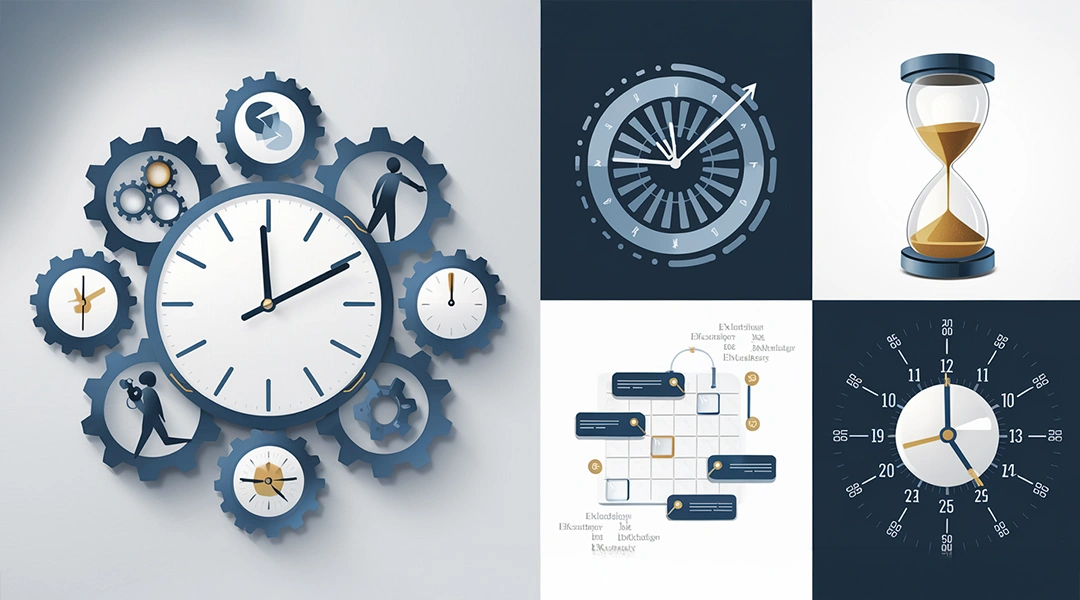Definition of Time Management:
Time management is the process of making optimal use of the available time in our lives, along with our personal talents, to achieve the important goals we aspire to — while maintaining a healthy balance between work demands, personal life, and the needs of the body, soul, and mind.
Time Management Is:
A process: Because it is continuous and ongoing, requiring daily practice and commitment.
Managing Available Time: Life offers times that can be organized and times that cannot. Organized time falls into two categories: Periods when you are at peak mental focus and energy. Periods of low concentration and diminished vitality. To organize your time effectively, identify when you are most alert and focused — this is your prime time for productivity.
Our personal talents: Because time utilization depends on our capabilities. The better, more developed, and effective your capabilities are, the more you can benefit from time compared to others.
Important goals: Because utilizing time (which is scarce and valuable) must be for important matters in our lives, not for trivial or minor goals.
Achieving balance: Because goals, tasks, and work must be evenly distributed between your work and personal life, without one dominating the other.
Needs: This means there are basic needs that time must be used to fulfill, which focus on building personal balance in human life, from spiritual requirements to mental requirements to physical requirements.
Types of Time
Time in our lives is of two types:
The first type: Time that is difficult to organize, manage, or use for anything other than what it’s allocated for. This is the time we spend on our basic needs such as sleeping, eating, resting, and important family and social relationships. This time cannot be used much for anything else. Undoubtedly, such time is important for maintaining our balance in life; without it, we cannot face other life demands, pursue earnings, or achieve our goals. However, this time should be within reasonable limits, as it is not wise to excessively extend sleeping, eating, or resting times, or waste time between these activities.
The second type: Time that can be organized and managed. We find part of this time in the period allocated for work and the other part in our personal lives. It is in this particular type of time that we face the big challenge: Can we make use of this time? Can we exploit it optimally? Note that this time, despite our ability to organize and manage it, is of two kinds. The first kind: when you are at your peak of activity and vitality, such as the first hours of the work day or the optimal activity hours in the day and night. The second kind: when you are at your lowest level of activity and vitality, such as the last hours of the work day or other low-activity hours in the day and night.
Time Wasters:
We mentioned that time is of two types: time that is difficult to organize and time that can be organized and utilized. When we analyze the time that is difficult to organize, we will discover that it contains a lot of wasted time.
For example, how much time do your meals take, especially lunch and dinner? What do you do with the time before and after meals? How much sleep time do you have in a day and night? How do you spend the time before and after sleep? What do you do with the time you have after coming home from work in the evening until you sleep? The reality is that if one starts thinking about their life and how they live it, they will discover that there is a lot of time that is not being utilized. Have you calculated these times? How many hours can you take from this time in a day and night? And if you took this time, what would you do with it?
Try as much as possible to cut from the first type of time, which is difficult to organize, and put it in the category of the second type of time that can be organized. Now, what about the time you can organize? How many hours in a day and night? And how many hours can you add to it from the first type? Have you ever thought about the things that waste your time? They are certainly many, some personal, meaning you are the cause, and some external, caused by people, events, and considerations around you.







